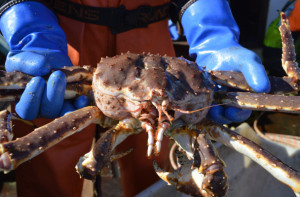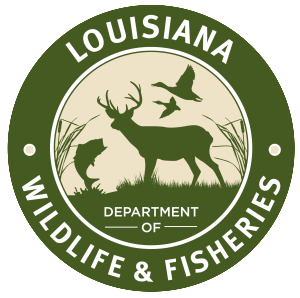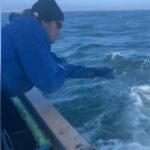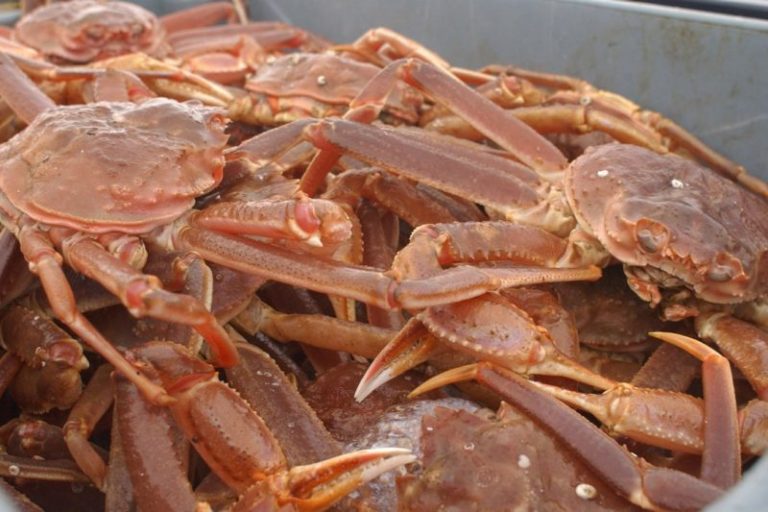Tag Archives: Japan
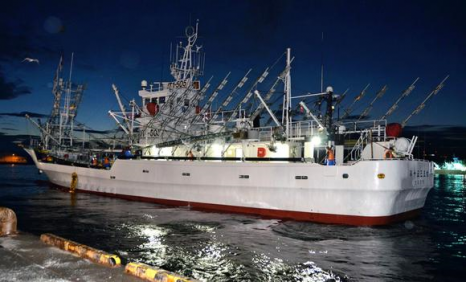
Tokyo’s proposal to cap saury catch tanks after neighbors slam it as unfair
The North Pacific Fisheries Commission held its annual meeting earlier this month to discuss an international framework to prevent overfishing. But its eight members were ultimately unable to agree on individual quotas for Pacific saury, a popular seasonal fish, amid strong opposition from China and other players. Tokyo had proposed annual caps of 242,000 tons on Japan’s catch, 191,000 tons for Taiwan and 47,000 tons for China. State-run China Central Television reported that Japan blamed China for the shrinking stock of saury, and said Tokyo’s proposal was “irrational” and unfairly tough on its neighbor. Chinese microblogging site Weibo erupted with disapproving posts. Users questioned why Japan should be allowed five times the catch when its population was just one-thirteenth of China’s, while others said Japan’s own problems with overfishing tuna gave it “no right to criticize other countries.” click here to read the story 18:18
Japan: New law a key step to resuming commercial whaling
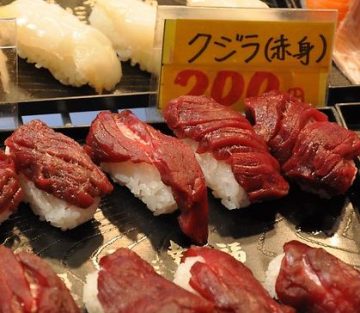 A recent law promoting whaling allows Japan to take a key step towards resuming commercial hunting of the giant mammals that are “a great source of food,” officials said on Thursday. Japan defies international protests to carry out what it calls scientific research whaling, having repeatedly said its ultimate goal is to whale commercially again. In the 2016-2017 season, its fleet took 333 minke whales in the Antarctic. The new law, passed in June, will help enshrine as a “national responsibility” an activity that was previously just a tacit policy, said Shigeki Takaya, director of the Whaling Affairs Office at Japan’s Fisheries Agency. click here to read the story 14:06
A recent law promoting whaling allows Japan to take a key step towards resuming commercial hunting of the giant mammals that are “a great source of food,” officials said on Thursday. Japan defies international protests to carry out what it calls scientific research whaling, having repeatedly said its ultimate goal is to whale commercially again. In the 2016-2017 season, its fleet took 333 minke whales in the Antarctic. The new law, passed in June, will help enshrine as a “national responsibility” an activity that was previously just a tacit policy, said Shigeki Takaya, director of the Whaling Affairs Office at Japan’s Fisheries Agency. click here to read the story 14:06
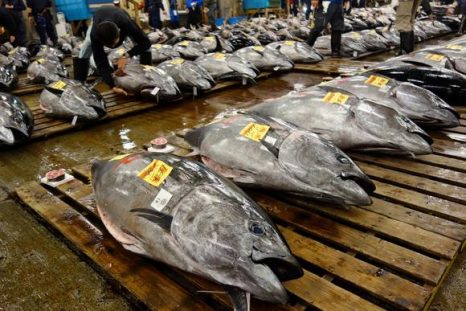
Japan on verge of breaking tuna fishing cap, unable to enforce self-imposed limit
Japan is poised to exceed an international commitment to limit catches of threatened Pacific bluefin tuna just two years after it adopted the cap, which has been undermined by lax compliance. Japan leads the world in catches and consumption of the fish. As of Monday, the Japanese bluefin catch had reached 99.7% of the agreed-on quota for the 12 months ending in June, making it only a matter of time — possibly within the next two weeks — until the commitment is broken. In 2015, Japan adopted limits on catches of immature bluefin, following a decision by the Western & Central Pacific Fisheries Commission. For the year to June, the quota comes to 4,007 tons, 3,995 tons of which had been caught as of Monday. click here to read the story (2 pages) 17:33
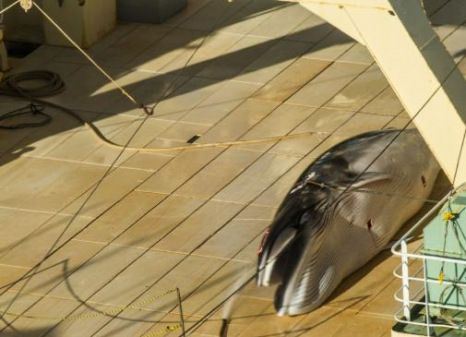
Australian Government ‘disappointed’ as minke whale slaughtered in our waters – Why the Hunt Goes On
The Federal Government has this morning condemned Japan after one of its ships was caught whaling in the waters off Antarctica. Anti-whaling group Sea Shepherd released photos showing a dead minke whale on the deck of the Nisshin Maru ship in the Australian whaling sanctuary. It appears the death was playing out at the same time as Japanese Prime Minister Shinzo Abe’s weekend meeting with Malcolm Turnbull in Sydney, at which the ABC reports whaling was ‘mentioned’, but focused on trade and defence. Japan is a signatory to the International Whaling Commission’s moratorium on whaling in force since 1986. But it exploits a loophole allowing whales to be killed for the purposes of “scientific research”. Read the story here What are the issues behind Japan’s whaling programme, and why has compromise been so difficult? Isn’t whaling banned? Not quite. The International Whaling Commission (IWC), which regulates the industry, agreed to a moratorium on commercial whaling from the 1985. But it did allow exceptions, enough for Japan to hunt more than 20,000 whales since. Read the story here 11:28
A look at the global eel trade reveals widespread fraud – In Japan, 9.6 tons of baby eels magically appeared in 2015
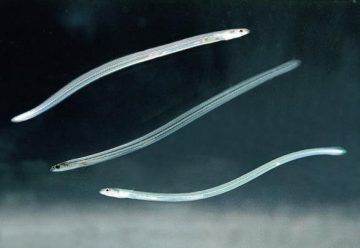 The glass eel trade is coming under international scrutiny. Already, cultured eels account for more than 99% of the world’s supplies. But the farming of these eels is totally reliant on elvers born in the wild. Although techniques to create artificial breeders to allow for the full cultivation of eels have been established, commercial production, as in the case of tuna, remains impossible. A big problem is that much of the glass eel trade essentially takes place in the dark. In Japan, the Fisheries Agency calculates the volume of the country’s eel catches by subtracting the amount of imported baby eels from that of domestic procurement. But the volume of domestic eel catches widely differs from the combined calculations of domestic catches done by prefectural governments, which issue the necessary permits. In the fishing season of 2015, for example, 18.3 tons of baby eels were procured domestically, while 3 tons were imported. The volume of eel caught domestically thus came to 15.3 tons. But data from prefectural governments, once tabulated, puts the total amount of domestic catches at 5.7 tons. The difference suggests that eel farms received 9.6 tons of glass eels from shadowy sources. Read the story here 10:36
The glass eel trade is coming under international scrutiny. Already, cultured eels account for more than 99% of the world’s supplies. But the farming of these eels is totally reliant on elvers born in the wild. Although techniques to create artificial breeders to allow for the full cultivation of eels have been established, commercial production, as in the case of tuna, remains impossible. A big problem is that much of the glass eel trade essentially takes place in the dark. In Japan, the Fisheries Agency calculates the volume of the country’s eel catches by subtracting the amount of imported baby eels from that of domestic procurement. But the volume of domestic eel catches widely differs from the combined calculations of domestic catches done by prefectural governments, which issue the necessary permits. In the fishing season of 2015, for example, 18.3 tons of baby eels were procured domestically, while 3 tons were imported. The volume of eel caught domestically thus came to 15.3 tons. But data from prefectural governments, once tabulated, puts the total amount of domestic catches at 5.7 tons. The difference suggests that eel farms received 9.6 tons of glass eels from shadowy sources. Read the story here 10:36
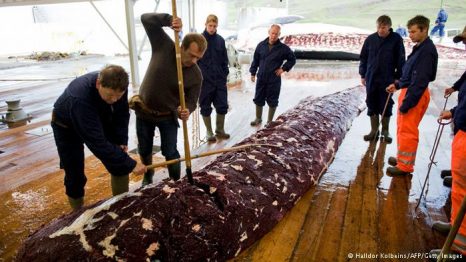
Controversial whale sanctuary to be voted on at the International Whaling Commission
A whale sanctuary in the South Atlantic covering an area as big as India and Russia together: This is the proposal presented by Argentina, Gabon, South Africa, Uruguay and Brazil at the 65th meeting of the International Whaling Commission in Slovenia, which runs from October 20 to 28. A heated debate between some 80 pro- and anti-whaling nations will lead tomorrow (25.10.2016) into voting on whether to give the green light to the proposal, or reject it once again – it happened in 1998. Japan, Iceland and Norway have been the three main countries blocking the sanctuary due – environmentalists say – to their commercial interests. These three nations have used legal loopholes and controversial arguments to keep hunting whales, even in existing sanctuaries. If the new sanctuary proposal is accepted, the immediate question following the hurrahs will be how to really protect whales there from countries that continue to insist on whaling. While the moratorium for commercial hunting from 1985 largely improved the protection of whales, threats such as by-catch or pollution were left out of the agreement. Whale sanctuaries are intended to fill that gap. Read the story here 13:12
Japanese Director Crowdfunds to Screen Pro-Whaling Film in U.S.
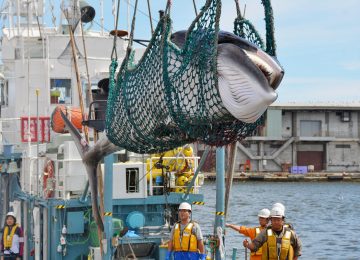 A Japanese filmmaker began a crowdfunding campaign to screen a documentary in the U.S. that defends the controversial whaling and dolphin hunting in Japan in an attempt to replicate the success of the American Oscar-winning film, The Cove, which won the Oscar for best documentary film in 2009 and fixed international attention on the Japanese coastal town of Taiji for its cruel methods of hunting whales and dolphins. The crowdfunding campaign, aimed at spreading awareness about the Japanese film that was conceived as a ‘counter documentary’ to The Cove, Tuesday opened to voluntary funding through its website, said the filmmaker, Keiko Yagi. Yagi’s documentary is called, Behind The Cove – The Quiet Japanese Speak Out, and the director focuses on the other side of the debate on whaling. Read the story here 16:28
A Japanese filmmaker began a crowdfunding campaign to screen a documentary in the U.S. that defends the controversial whaling and dolphin hunting in Japan in an attempt to replicate the success of the American Oscar-winning film, The Cove, which won the Oscar for best documentary film in 2009 and fixed international attention on the Japanese coastal town of Taiji for its cruel methods of hunting whales and dolphins. The crowdfunding campaign, aimed at spreading awareness about the Japanese film that was conceived as a ‘counter documentary’ to The Cove, Tuesday opened to voluntary funding through its website, said the filmmaker, Keiko Yagi. Yagi’s documentary is called, Behind The Cove – The Quiet Japanese Speak Out, and the director focuses on the other side of the debate on whaling. Read the story here 16:28
Why do some countries still hunt whale’s?
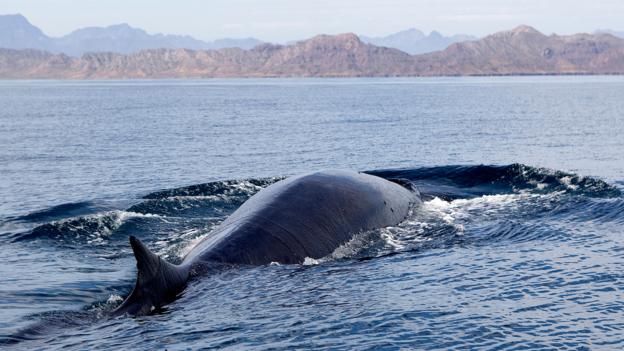 The “hacktivist” group Anonymous recently took down many Icelandic government websites, in protest at the country’s practice of . “Whales do not have a voice. We will be a voice for them. It’s time to speak out about this impending extinction of a species,,, Iceland is not the only country that still practices whaling: Norway and Japan also do so, as do a few smaller populations. This often baffles and horrifies people from elsewhere. If so many people are opposed to it, why are countries still whaling? (because they’re sustainable?) Read the article here 08:39
The “hacktivist” group Anonymous recently took down many Icelandic government websites, in protest at the country’s practice of . “Whales do not have a voice. We will be a voice for them. It’s time to speak out about this impending extinction of a species,,, Iceland is not the only country that still practices whaling: Norway and Japan also do so, as do a few smaller populations. This often baffles and horrifies people from elsewhere. If so many people are opposed to it, why are countries still whaling? (because they’re sustainable?) Read the article here 08:39
Sea Shepherd warns Japan on whaling – Is this the year Sea Shepherds get someone killed?
 Sea Shepherd warned Japan on Sunday against resuming “research” whaling in the Antarctic and called on the Australian government to intervene. After a decade of harassment by Sea Shepherd, Japan was forced to abandon its 2014-15 Southern Ocean hunt after the International Court of Justice said the annual expedition was a commercial activity masquerading as research. But on Saturday Japanese media reported that it would start again next year, despite a call by global regulators for more evidence that the expeditions have a scientific purpose. Read the article here 21:18
Sea Shepherd warned Japan on Sunday against resuming “research” whaling in the Antarctic and called on the Australian government to intervene. After a decade of harassment by Sea Shepherd, Japan was forced to abandon its 2014-15 Southern Ocean hunt after the International Court of Justice said the annual expedition was a commercial activity masquerading as research. But on Saturday Japanese media reported that it would start again next year, despite a call by global regulators for more evidence that the expeditions have a scientific purpose. Read the article here 21:18
Powerful typhoon kills 11,000 farmed bluefin tuna in Japan
 Typhoon Nangka made landfall in southwestern Japan on the night of July 16 and slowly moved northward before turning into a tropical depression. Torrential rain and gusts of wind wreaked havoc in various parts of western Japan, also causing high waves and clouding sea water in the fish farm near the Pacific coastal town of Kushimoto, Kyodo News and the Asahi newspaper reported. The storm caused the sensitive bluefin tuna to panic, the Asahi said, with the Mainichi daily saying the waves had driven many of them into a barrier. Read the rest here 11:04
Typhoon Nangka made landfall in southwestern Japan on the night of July 16 and slowly moved northward before turning into a tropical depression. Torrential rain and gusts of wind wreaked havoc in various parts of western Japan, also causing high waves and clouding sea water in the fish farm near the Pacific coastal town of Kushimoto, Kyodo News and the Asahi newspaper reported. The storm caused the sensitive bluefin tuna to panic, the Asahi said, with the Mainichi daily saying the waves had driven many of them into a barrier. Read the rest here 11:04
Japan confirms plan to resume sustainable whale hunt
 Joji Morishita said the whole debate about whether or not Japan should be killing the mammals had long since moved away from science and into politics. Japan believes the world’s whale population, especially the minke stock, is sizeable enough to accommodate a return to sustainable whaling, putting it at odds with campaigners and anti-whaling nations. “If you keep on like this, I worry that a country which has international political power could impose its standards and ethics on others,” he said, calling it “environmental imperialism”. Read the rest here 13:28
Joji Morishita said the whole debate about whether or not Japan should be killing the mammals had long since moved away from science and into politics. Japan believes the world’s whale population, especially the minke stock, is sizeable enough to accommodate a return to sustainable whaling, putting it at odds with campaigners and anti-whaling nations. “If you keep on like this, I worry that a country which has international political power could impose its standards and ethics on others,” he said, calling it “environmental imperialism”. Read the rest here 13:28
Japan Won’t Accept “No” to Whaling
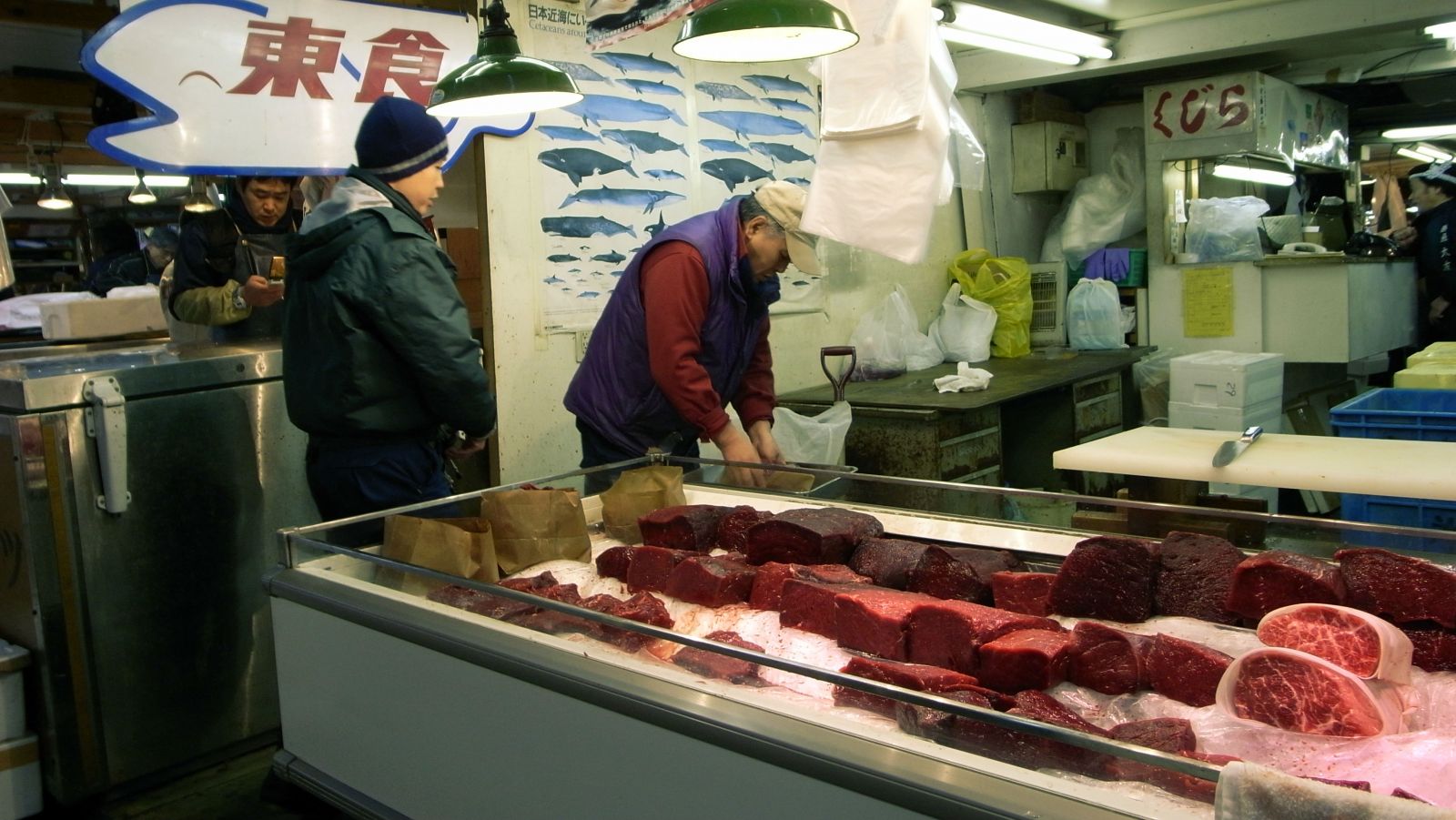 Japan on Monday said it hoped to resume its Antarctic whale hunt around the end of this year, after providing further information to win over an international panel that says its whaling plan does not prove the need for killing the animals. Japan has long maintained that most whale species are not endangered and that eating whale is part of its food culture. Read the rest here 09:32
Japan on Monday said it hoped to resume its Antarctic whale hunt around the end of this year, after providing further information to win over an international panel that says its whaling plan does not prove the need for killing the animals. Japan has long maintained that most whale species are not endangered and that eating whale is part of its food culture. Read the rest here 09:32
China, Japan block Antarctic fisheries regulation as rorts continue – Sea Shepherds to Ride Herd!
 Korean authorities found a fleet of three ships fabricated catch documents and ship tracks, apparently with Russian help,,,Commission for the Conservation of Antarctic Marine Living Resources (CCAMLR) shows. Questions, about official scientific observers from Russia aboard the Insung ships who reported “anomalous” fishing data. Britain said there was “no other option than to assume the observers on board were complicit”. Read the rest here 09:14
Korean authorities found a fleet of three ships fabricated catch documents and ship tracks, apparently with Russian help,,,Commission for the Conservation of Antarctic Marine Living Resources (CCAMLR) shows. Questions, about official scientific observers from Russia aboard the Insung ships who reported “anomalous” fishing data. Britain said there was “no other option than to assume the observers on board were complicit”. Read the rest here 09:14
Pacific Bluefin tuna fishery on the hook
 The U.S. sport fishery is only a portion of the total catch of bluefin throughout the Pacific, and U.S. commercial fishing operations play an even smaller role. Commercial fisheries in Mexico, Japan, Korea and Taiwan out of bluefin, and are also under pressure to act. Japan recently agreed to cut its commercial catch by half, and both the U.S. and Mexico recently closed their commercial fisheries, Read the rest here 11:47
The U.S. sport fishery is only a portion of the total catch of bluefin throughout the Pacific, and U.S. commercial fishing operations play an even smaller role. Commercial fisheries in Mexico, Japan, Korea and Taiwan out of bluefin, and are also under pressure to act. Japan recently agreed to cut its commercial catch by half, and both the U.S. and Mexico recently closed their commercial fisheries, Read the rest here 11:47
Pacific Rim nations agree to halve take of dwindling bluefin tuna
 Japan, South Korea and the United States agreed Thursday on new annual limits on the catch of dwindling young bluefin tuna in an effort to double the population within a decade. The conservation plan announced by the Western and Central Pacific Fisheries Commission after a meeting in the western Japanese city of Fukuoka aims to boost the depleted stock by counting the accidental catch of young bluefin tuna by long-net trawling as part of the regulated take. Read the rest here 11:27
Japan, South Korea and the United States agreed Thursday on new annual limits on the catch of dwindling young bluefin tuna in an effort to double the population within a decade. The conservation plan announced by the Western and Central Pacific Fisheries Commission after a meeting in the western Japanese city of Fukuoka aims to boost the depleted stock by counting the accidental catch of young bluefin tuna by long-net trawling as part of the regulated take. Read the rest here 11:27
Japan: Population of Fishermen Hit by Earthquake, Aging
 Of the 89,485 privately managed fishery businesses in the country, only 14,811, or 17%, say they have someone who can be a successor in the trade, suggesting many sons and daughters of fishermen have moved to other occupations. Read more here 12:47
Of the 89,485 privately managed fishery businesses in the country, only 14,811, or 17%, say they have someone who can be a successor in the trade, suggesting many sons and daughters of fishermen have moved to other occupations. Read more here 12:47
Japan plans to propose a 50 percent cut on catches of young bluefin tuna in the Western and Central Pacific
Japan plans to propose a 50 percent cut on catches of young bluefin tuna in the Western and Central Pacific, officials said Tuesday (Aug 26), in a historic shift aimed at safeguarding the at-risk species. Tokyo – the world’s biggest consumer of tuna – has been reluctant to reduce catches, despite mounting scientific evidence that stocks are near collapse. Read more here 11:35
China Will Solve Maritime Disputes Through Direct Talks – remember the Geoduck ban ?

Japan aims to resume whaling in Antarctic – A Sustainable Natural Resource
 Japan’s eventual goal is to resume commercial whaling. What Tokyo calls “research whaling” is aimed at collecting scientific data to prove that catching whales commercially would not dent sustainable use of the whale stocks. The government also decided to continue its whaling in the Pacific Ocean this fiscal year, with whalers set to depart later this month. abs-cbnnews Read more here 10:07
Japan’s eventual goal is to resume commercial whaling. What Tokyo calls “research whaling” is aimed at collecting scientific data to prove that catching whales commercially would not dent sustainable use of the whale stocks. The government also decided to continue its whaling in the Pacific Ocean this fiscal year, with whalers set to depart later this month. abs-cbnnews Read more here 10:07
Japan must end its annual Antarctic whale hunt, UN orders in landmark ruling
 United Nations judges have ordered Japan to end whale hunts in the Antarctic after dismissing Japanese arguments that the hunting was carried out for scientific research purposes. Read more here 10:53
United Nations judges have ordered Japan to end whale hunts in the Antarctic after dismissing Japanese arguments that the hunting was carried out for scientific research purposes. Read more here 10:53
Global powers sign declaration on sustainable fishing
ATHENS) – Officials from some of the world’s top fishing powers signed a declaration in Greece on Friday to promote sustainable management of fish stocks. The signatories — the EU, United States, Japan, Philippines, Colombia and Indonesia — pledged to support measures to address fishing overcapacity. Read more here eubusiness.com 14:08
Multinational search for missing crewmember in the Western Pacific
POHNPEI, FSM—Multiple agencies from the Federated States of Micronesia, Japan, and the U.S. coordinated efforts, over the course of five days, to search for a crewmember that was reported missing from the Japanese fishing vessel Chokyu Maru 35. A total of 2,234 square nautical miles were covered during the search. more@saipantribune 17:18
Pew: The Pacific 6: Chinese Taipei, South Korea, Japan, Indonesia, China and the United States are responsible for 80% of the annual catch of big eye tuna,
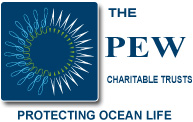 The accompanying analysis, by Pew Charitable Trusts attending the Western and Central Pacific Fisheries Commission meeting in Cairns Australia this week, also documents the destructive methods they use to dominate the $USD 7billion industry. The 43 member countries of the body responsible for the world’s largest tuna fishery – the Western and Central Pacific Fisheries Commission – will negotiate from today on an action plan to end overfishing of bigeye tuna by 2018. [email protected] 09:23
The accompanying analysis, by Pew Charitable Trusts attending the Western and Central Pacific Fisheries Commission meeting in Cairns Australia this week, also documents the destructive methods they use to dominate the $USD 7billion industry. The 43 member countries of the body responsible for the world’s largest tuna fishery – the Western and Central Pacific Fisheries Commission – will negotiate from today on an action plan to end overfishing of bigeye tuna by 2018. [email protected] 09:23
Senator seeks $15M for tsunami debris – Begich – “We have that option right now to do something,”
Sen. Mark Begich said it’s embarrassing that the government of Japan has put more funding toward the debris cleanup than the U.S. government has. He said the impact of debris from the 2011 earthquake and tsunami in Japan reaching U.S. shores is as much a natural disaster as a hurricane, drought or wildfire — it’s just unfolding in slow motion. Read more: http://www.alaskajournal.com/Alaska-Journal-of-Commerce/December-Issue-2-2012/Senator-seeks-15M-for-tsunami-debris/


































